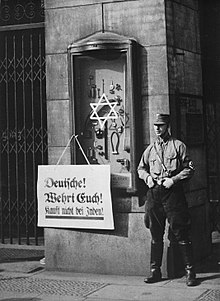Richard Stern (entrepreneur)
Richard Stern (born February 22, 1899 in Weilerswist ; died December 19, 1967 in Allentown (Pennsylvania) , USA ) was a German entrepreneur who emigrated from Germany to the United States in 1939 due to the persecution of Jews . He became known for publicly defending himself against the boycott of the National Socialists against Jewish businesses.
Life
After graduating from school, Stern completed a commercial apprenticeship at an Israelite school . At the age of 18 he was drafted, fought in the First World War as a machine gunner in Russia and on the Western Front and was awarded the Iron Cross, 2nd class.
After the war he worked as an employee and from 1924 supported his father in his Cologne bed and upholstery shop at Marsilstein 20, which he took over entirely in 1928.
Richard Stern was a member of the Reich Association of Jewish Front Soldiers , the aim of which was to ward off anti-Semitic tendencies, citing the deployment of 85,000 German Jews in World War I.
Protest against the Nazi boycott of Jewish shops

The " Jewish boycott " announced by Reich Propaganda Minister Goebbels for April 1, 1933 and planned by Julius Streicher was prepared by local Nazi organizing committees all over Germany. According to precise instructions, uniformed and, in some cases, armed guards from Nazi organizations were to be posted in front of Jewish shops, doctors 'and lawyers' offices and prevented customers from entering them all day long. In addition, banners and signs were put up, calling for a boycott of the shops and also calling for the avoidance of Jewish service providers. Anyone who disregarded this as a customer had to reckon with a determination of his personal details or a photograph of his behavior. There was also violence against customers and against Jewish business people. Quite a few, like the Cologne master butcher Arnold Katz and his son Benno, were hung with insulting signs and driven through the streets by uniformed men.
After the announcement of the boycott, Richard Stern had a leaflet he had written and distributed, in which he protested against the boycott and appealed to the solidarity of the people of Cologne, citing the high reputation that the soldiers at the front also enjoyed under the Nazis in the Prussian tradition. In the leaflet, he expressly and confidently referred to the merits of Jewish front-line soldiers in the First World War. Under the heading "To all frontline comrades and Germans" next to a large iron cross he quoted the statement of Adolf Hitler , Wilhelm Fricks and Hermann Göring :
- "Who in the III. Richly insulted a soldier at the front will be punished with penitentiary ".
Then he described his own commitment as well as that of his brother and father in the war and asked whether he had to allow himself to be insulted in this way as a “good German” and whether “the German Jew has now become a second class person who is only one tolerates as a guest in his fatherland? ”He described the boycott as“ desecrating the memory of 12,000 fallen soldiers of the Jewish faith ”and“ an insult to every decent citizen ”and finally expressed the hope of“ civil courage ”on the part of the Cologne people. He signed with his full address as "The former combatant Richard Stern".
On April 1, 1933, despite the boycott, he opened his shop and stood with his iron cross on his lapel in the entrance next to the SA post that was set up in front of the shop. During the day, Stern was arrested, but was released that evening after an acquaintance spoke out on his behalf.
Stern was not the only one who openly opposed the beginning repression of the Nazi regime. There are also reports of other shopkeepers who demonstrated their "defenseless Germanness" in various places with war decorations. However, Stern's action became particularly well-known through a photo taken.
Stern himself remained disillusioned with the way the new Germany dealt “with democrats (...), especially if they were Jews”.
Flight and emigration
When the pressure of persecution from the National Socialists increased and Stern's business was affected by the November pogrom of 1938, he managed to emigrate to the USA in 1939. There he fought for the armed forces of the United States from 1942 and was deployed in Europe. As a sergeant , he briefly returned to Cologne in 1945, where he learned that no fewer than 53 of his family members had been deported and murdered.
After working as a worker and managing director in the USA, he was finally back to work as an independent entrepreneur. He died there in 1967.
See also
literature
- Dieter Corbach: "I cannot be silent!" Richard Stern, Cologne, Marsilstein 20 . Scriba-Verlag, Cologne 1988, ISBN 3-921232-40-6 .
Web links
- Flyer from Richard Stern on spiegel-online.de
- The photo of Richard Stern with an Iron Cross in front of his shop, www.museenkoeln.de
Individual evidence
- ↑ Dieter Corbach: "I cannot be silent!", P. 7
- ↑ a b c Ulrich S. Soenius, Jürgen Wilhelm (Ed.): Kölner Personen-Lexikon . Greven, Cologne 2007, ISBN 978-3-7743-0400-0 . Entry to Richard Stern.
- ↑ a b c Kirsten Serup-Bilfeldt: Between the Cathedral and the Star of David: Jewish life in Cologne from the beginning until today . KIWI, Cologne 2001, ISBN 3-462-03508-8 , pp. 129-130.
- ↑ Various references and quotations in Dominik Jesse: Richard Stern's self-assertion on April 1, 1933 . GRIN-Verlag, 2005, ISBN 3-638-49908-1 . ; P. 11
- ↑ Corbach, p. 14
| personal data | |
|---|---|
| SURNAME | Stern, Richard |
| BRIEF DESCRIPTION | German entrepreneur and emigrant |
| DATE OF BIRTH | February 22, 1899 |
| PLACE OF BIRTH | Weilerswist |
| DATE OF DEATH | December 19, 1967 |
| Place of death | United States |